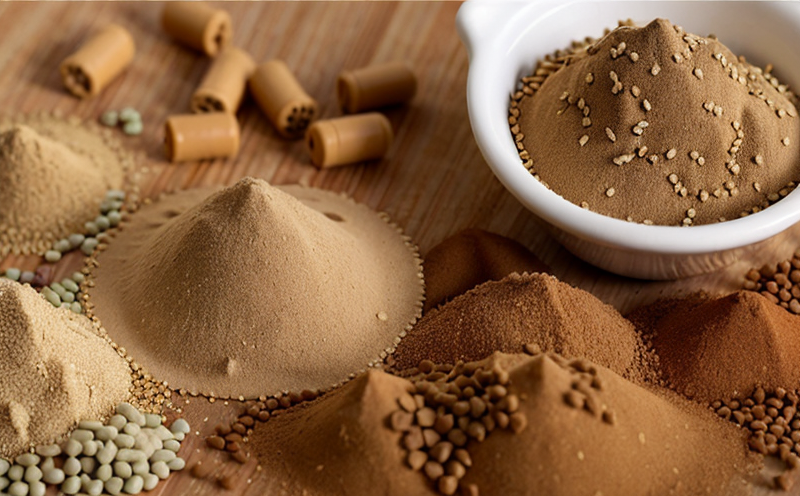Spiramycin Residue Testing in Animal Feed
The presence of veterinary drug residues like Spiramycin in animal feed can have significant implications for both food safety and public health. As a leading agricultural laboratory, Eurolab offers specialized testing services to ensure compliance with international standards and regulations. This service is critical in maintaining the integrity of the global food supply chain.
Spiramycin is an antibiotic used primarily in veterinary medicine to treat infections caused by gram-positive bacteria such as Streptococcus pneumoniae, Staphylococcus aureus, and Streptococcus pyogenes. In livestock production, Spiramycin can be administered to prevent or treat respiratory diseases and other bacterial infections.
However, the use of antibiotics in animal feed is strictly regulated by international standards such as ISO 3696:2014 and EU regulation (EC) No 37/2008. Exceeding permissible limits can lead to antibiotic residues in meat products, posing a risk to human health. Therefore, rigorous testing of Spiramycin residues is essential for ensuring food safety.
At Eurolab, our state-of-the-art laboratory facilities and experienced technical staff provide precise and reliable results using advanced analytical techniques. Our services include:
- Comprehensive analysis of Spiramycin residues in animal feed
- Detailed reporting aligned with international standards (ISO 3696:2014)
- Customized testing packages for different types of feeds
- Timely delivery of results to facilitate quick decision-making
The process involves meticulous sample preparation, extraction, and analysis. We employ validated methods such as Liquid Chromatography-Mass Spectrometry (LC-MS/MS) which offers high sensitivity and specificity for detecting even trace levels of Spiramycin.
Our testing services are designed to meet the stringent requirements set by regulatory authorities worldwide. For instance, the EU regulation sets a maximum residue limit (MRL) of 20 μg/kg in feed intended for ruminants like cattle and sheep. Our laboratory ensures that all tests comply with these limits.
By partnering with Eurolab, you can rest assured that your products meet the highest standards of quality and safety. This service not only helps you avoid potential legal penalties but also enhances consumer trust in your brand.
Eurolab Advantages
At Eurolab, we pride ourselves on providing unparalleled testing services that go beyond mere compliance. Our key advantages include:
- Expertise and Experience: Our technical staff are highly skilled and experienced in conducting Spiramycin residue tests.
- Advanced Technology: We utilize cutting-edge instruments like LC-MS/MS to ensure accurate results.
- Comprehensive Services: From initial consultation to final report, our services cover every aspect of the testing process.
- Timeliness: Rapid turnaround times allow you to make informed decisions swiftly.
We understand that time is critical in the agricultural sector. Our efficient processes ensure that your samples are analyzed promptly and results delivered without delay.
Competitive Advantage and Market Impact
The global demand for safe, high-quality animal feed continues to grow, driven by increasing livestock production and stricter food safety regulations. By offering reliable Spiramycin residue testing services, Eurolab positions itself as a leader in the agricultural sector.
Our comprehensive testing ensures that your products meet or exceed regulatory requirements, providing you with a competitive edge. Consumers are becoming increasingly aware of the importance of food safety, and having a trusted third-party laboratory like Eurolab can significantly enhance brand reputation and customer confidence.
Moreover, compliance with international standards not only protects your business from legal issues but also fosters trust among stakeholders. This can lead to stronger partnerships and increased market share. Our services are tailored to meet the unique needs of the agricultural industry, ensuring that you stay ahead in a competitive market.
Use Cases and Application Examples
| Use Case | Description |
|---|---|
| Routine Quality Control | Regular testing to ensure consistent compliance with regulatory limits. |
| New Product Development | Evaluating the safety of new feed formulations before market release. |
| Supplier Verification | Assuring that feed ingredients from suppliers meet required standards. |
| Post-Market Surveillance | Monitoring for any unexpected presence or levels of Spiramycin residues after product launch. |
- Routine Quality Control: Regular testing helps in maintaining consistent quality and compliance with regulatory limits. This proactive approach ensures that feed products consistently meet safety standards.
- New Product Development: Before introducing a new product to the market, it is crucial to verify its safety through rigorous testing. This includes assessing the presence of Spiramycin residues to ensure they do not exceed permissible levels.
- Supplier Verification: Partnering with reliable suppliers is vital in ensuring consistent quality and compliance. Testing feed ingredients from suppliers helps in verifying their adherence to regulatory standards, thus protecting your brand's reputation.
- Post-Market Surveillance: After the product has been launched, it is essential to monitor for any unexpected issues or changes in the levels of Spiramycin residues. This can help in addressing potential safety concerns early on.





